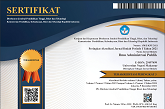The Influence of Organizational Climate on Simultaneous the Effectiveness of General Election Public Services During the Covid-19 Pandemic
(1) Public Administration , Universitas Bina Taruna, Indonesia
(2) Public Administration , Universitas Bina Taruna, Indonesia
(3) Public Administration , Universitas Bina Taruna, Indonesia
(*) Corresponding Author
DOI: https://doi.org/10.26858/jiap.v12i2.41298
Abstract
ABSTRACT
This research aims to determine and analyze the influence of organizational climate on simultaneous general election public services during the Covid-19 Pandemic at the General Election Commission Bone Bolango regency. This study uses a questionnaire as a primary data collection tool and data analysis techniques in quantitative research using statistics. The statistical test used in this study is descriptive statistics which is carried out to find the effect between the two variables through analysis of the regression test. The variables used in this study are Organizational Climate as the independent variable and public service as the dependent variable. This study found that the simple linear regression coefficients from organizational climate data and the effectiveness of simultaneous general election public services during the Covid-19 Pandemic were obtained at a = 19.38 and b = 0.30. Thus, the form of the simple linear regression equation obtained is Y = 19.38 + 0.30x. The results of the analysis of variance show that this equation is linear. In other words, the linear regression equation model is accepted and can be used to predict that if the organizational climate increases by one unit, the effectiveness of simultaneous general election public services during the Covid-19 Pandemic will increase by 0.30 units at a constant rate of 19.38 .
Keywords
Full Text:
PDFReferences
Aiken, L. H., Sloane, D., Griffiths, P., Rafferty, A. M., Bruyneel, L., McHugh, M., Maier, C. B., Moreno-Casbas, T., Ball, J. E., & Ausserhofer, D. (2017). Nursing skill mix in European hospitals: cross-sectional study of the association with mortality, patient ratings, and quality of care. BMJ Quality & Safety, 26(7), 559–568.
Amrizal, D., Yusriati, Y., & Lubis, H. (2018). The Role of General Election Commission (KPU) in Increasing Voters’ Participation in Langkat, Medan, Indonesia. Budapest International Research and Critics Institute (BIRCI-Journal): Humanities and Social Sciences, 1(2), 13–24.
Atmadja, A. T., Saputra, K. A. K., & Koswara, M. K. (2018). The influence of village conflict, village apparatus ability, village facilitator competency and commitment of local government on the success of budget management. Academy of Accounting and Financial Studies Journal, 22(1), 1–11.
De Graaf, G. (2011). The loyalties of top public administrators. Journal of Public Administration Research and Theory, 21(2), 285–306.
Djellal, F., Gallouj, F., & Miles, I. (2013). Two decades of research on innovation in services: Which place for public services? Structural Change and Economic Dynamics, 27, 98–117.
Doherty, T. L., Horne, T., & Wootton, S. (2014). Managing public services-implementing changes: a thoughtful approach to the practice of management. Routledge.
Gorla, N., Somers, T. M., & Wong, B. (2010). Organizational impact of system quality, information quality, and service quality. The Journal of Strategic Information Systems, 19(3), 207–228.
Hanefeld, J., Powell-Jackson, T., & Balabanova, D. (2017). Understanding and measuring quality of care: dealing with complexity. Bulletin of the World Health Organization, 95(5), 368.
Harefa, R. K., & Adhani, A. (2021). The role of the general election commission to increase community political participation in the 2020 general election of Medan city. COMMICAST, 2(2), 139–143.
Jatmiko, B., Laras, T., & Rohmawati, A. (2020). Budgetary participation, organizational commitment, and performance of local government apparatuses. The Journal of Asian Finance, Economics and Business, 7(7), 379–390.
Johnson, G. (2014). Research methods for public administrators. Routledge.
Ma, L., & Christensen, T. (2020). Mapping the evolution of the central government apparatus in China. International Review of Administrative Sciences, 86(1), 80–97.
O’Sullivan, E., Rassel, G., Berner, M., & Taliaferro, J. (2016). Research methods for public administrators. Routledge.
Osborne, S. P. (2010). Delivering public services: time for a new theory? Taylor & Francis.
Renshaw, C., & Lidauer, M. (2021). The Union Election Commission of Myanmar 2010–2020. Asian Journal of Comparative Law, 1–20.
Shafritz, J., Russell, E. W., Borick, C., & Hyde, A. (2016). Introducing public administration. Routledge.
Susanty, A. I., Yuningsih, Y., & Anggadwita, G. (2018). Knowledge management practices and innovation performance: A study at Indonesian Government apparatus research and training center. Journal of Science and Technology Policy Management.
Tanaamah, A. R., Hastari, P., & Tanaem, P. F. (2019). Silon KPU: The perspective of IT balanced scorecard framework in general election commissions (KPU) of Surakarta. Procedia Computer Science, 161, 4–14.
Article Metrics
Abstract view : 147 times | PDF view : 1 timesRefbacks
- There are currently no refbacks.
Copyright (c) 2022 Rahmat Ismail Datau, Lisda Van Gobel, Elnino Husain Mohi

This work is licensed under a Creative Commons Attribution 4.0 International License.
Diterbitkan oleh:
Program Studi Ilmu Administrasi Publik
Program Pascasarjana Universitas Negeri Makassar
JIAP Index By:

This work is licensed under a Creative Commons Attribution 4.0 International License.









